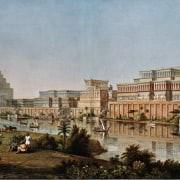The book of Nahum
Jonah preaching to the pagan capital of Assyria has made Nineveh famous. But Nahum is 150 years later and Assyria has been as full of the violence and bloodshed as the empire it was known for. Unlike Jonah, Nahum tells Nineveh and Assyria of their certain fall and doom with no chance to repent (1:9). Nahum poetically visualises a courtroom scene to describe his words. This could be broken up into three big sections.
Firstly, in Nahum 1:1-7 we have a statement of the character of the judge. We look up to the bench to examine the kind of judge that will issue a verdict to Nineveh. We behold God as a Judge and a Father. When the Christian looks at God the judge it should immediately make us utterly thankful to Jesus. He has taken the judgement upon himself. God as Judge is jealous, vengeful, furious, wrathful, great in power, and will not acquit the wicked and indignant. His holiness as Judge is awfully awesome.
But He is also Father. As Father God He is slow to anger, good, a stronghold in the day of trouble, and one who knows them that trust Him. When we put these together we see that God has taken His time with Assyria. He sent Jonah; He has borne with them for years. But now after many years and many warnings the time for them to receive justice has come.
Secondly, in Nahum 1:8-14 we see the verdict passed upon Nineveh. God knows everything. He puts all they have done onto the scales and because of what they have done he issues the verdict and sentence. Because of Nineveh’s wickedness it is condemned to utter destruction (1:8-9), to be captured like a drunkard (1:10), have their name blotted out (1:14), to have their grave dug by God (1:14).
Thirdly the execution is described in chapters 2-3. The Medes and Babylonians completely destroyed Nineveh in 612 B.C at the high point of its power. Nahum’s prophecy came true. The Tigris floods and washes away a large part of the wall thought impenetrable. Pandemonium erupts in the city as drunken nobles try to rally the troops as they discover vast armies of Medes gathered with brilliantly painted shields, bright robes and shining spears. The destruction is total. So deep is that grave that God digs for Nineveh that the ruins were only found in 1845. Until then the stories of Nineveh were considered mythical. What Nineveh sowed it reaped. They told God He didn’t exist and wasn’t worth seeking or knowing, and so Nineveh ceased to exist and wasn’t known or found. Their sin was punished and their wealth couldn’t stop it (3:1-19).
For us there are many teachings in Nahum. Jesus’ sacrifice taking God’s justice upon himself is shown magnificent. God is the God of all the nations of the world. People who don’t turn to the God of the Bible truly do have an end that is horrible to even think of.
Pic: Nineveh, by James Ferguson (1853)

